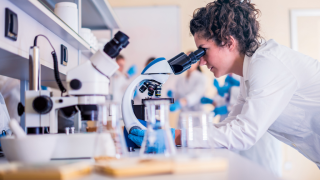
We welcome the recognition that Life Sciences, the scientific study of living organisms including humans, is a key target for investment and growth in the UK’s autumn budget – but without strategic planning, the urgent need for animal-free science could be missed.
To deliver on its commitment to phase out animal testing, the government must prioritise funding for non-animal technologies, such as 3D cell cultures, organs-on-chips and advanced computer modelling. This has the potential to revolutionise safety testing and drug development while supporting the ultimate goal of phasing out animal testing.
We urge the government to set out how it will ensure that investment in Life Sciences will help deliver its manifesto commitment and ensure the UK leads in cutting-edge science based on non-animal methods.
Leading in animal-free science would help to establish the UK as a global power in scientific innovation, and enable high-quality research relevant to the protection of human health and the environment.
Home Office statistics show that there were over 2.68 million uses of animals in laboratories in Great Britain in 2023 – a decrease of just 3% on 2022. Around 9% of those were in tests legally required by regulators to assess the safety or effectiveness of chemicals, medicines and other products; 29% were in basic, curiosity-driven research; and 14% were in research into treatments or cures for diseases, that are purely exploratory and not required by law.
More can and should be done to end animal use in UK laboratories.
Animal Welfare Minister, Baroness Sue Hayman, announced in September that development of the government’s phase-out plan will be led by Lord Patrick Vallance, Minister of State for Science, Research and Innovation.
A shocking 92% of medicines currently fail in human clinical trials even though they passed preclinical tests (including animal tests); 55% of failures are due to lack of efficacy while 28% are due to toxic effects in humans. This failure rate rises to over 99% in drugs aimed at treating complex and poorly understood conditions, such as Alzheimer’s. When developing a single new drug can cost approximately £3 billion and take 10-15 years, continuing with animal testing is a huge waste of time and money as well as harmful to human health.
In contrast, the non-animal methods that are available are often quicker, cheaper and more reliable. The UK must prioritise funding an animal-free future for all areas of testing and research.
Our ‘Creating a cruelty-free future’ report outlines our initial recommendations to assist the government in their plans to phase-out animal testing in the UK.
Our Director of Science and Regulatory Affairs, Dr Emma Grange, said: “The Budget spoke boldly of innovation, R&D investment and our Life Sciences industry, and we hope that the government will combine those ambitions with its commitment to phasing out animal testing in the UK. This needs to also be accompanied by incentives to encourage scientists, industry and regulators to move away from the use of animals. Harnessing the possibilities of non-animal technology could truly make the UK a global leader and boost the economy at the same time.”
Every minute, five animals suffer in experiments in British laboratories. By donating today, you could help us carry out research into non-animal test methods and make sure they are used. Will you join the fight for a cruelty-free UK today?
